|
|
|
Sort Order |
|
|
|
Items / Page
|
|
|
|
|
|
|
| Srl | Item |
| 1 |
ID:
178164
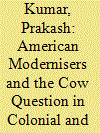

|
|
|
|
|
| Summary/Abstract |
The cattle modernisation sought by American missionaries in colonial North India advanced a productivist argument around the efficiency of cattle and their contribution to agriculture. On the face of it, by criticising the excessive supply of cattle in North India, this position went against the core preservationist concerns of the cow protectionists. But in reality, these modernisers struck a range of correlations with colonial and nationalist positions on the management of livestock and, ironically, even some limited space with the cow protectionists in treating India’s cattle as productive beings that were beneficial to the nation. These American prescriptions were stable constructs that became visible once again in the American food aid apparatus in India after Independence and shared overlapping concerns with ongoing cattle productivity debates in India. This paper illuminates the overlaps between the advocacy of the multiple constituents and a recurrence of certain patterns of contestation that were constitutive of the very paradigm of agrarian modernisation.
|
|
|
|
|
|
|
|
|
|
|
|
|
|
|
|
| 2 |
ID:
178160
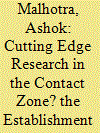

|
|
|
|
|
| Summary/Abstract |
By 1928, Robert McCarrison’s laboratories in the South Indian hill station of Coonoor had become recognised as the centre for nutritional research in India. Five years earlier, however, his institute had faced closure. This article argues that the establishment of McCarrison’s institute was based on his pitch to the Royal Commission on Agriculture in India in 1926, in which he successfully aligned his research to satisfy the concerns of various members of the Commission. This discussion uses McCarrison’s lobbying for his institute as a case study to examine the broader political manoeuvrings that colonial scientists in the early twentieth century often had to undertake to establish their research agendas.
|
|
|
|
|
|
|
|
|
|
|
|
|
|
|
|
| 3 |
ID:
178161
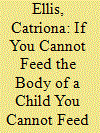

|
|
|
|
|
| Summary/Abstract |
In 1925 the Madras Municipal Corporation introduced an innovative scheme to provide free midday meals for poor schoolchildren in the city. These meals were designed to both improve the physical health of the schoolchildren and contribute to their educational attainments. This paper examines the advice of nutritional experts at the Coonoor Centre for Nutritional Research and the new scientific emphasis on diet and malnutrition in South India. It then considers the debates among the corporation’s elected councillors regarding the particular nutritional needs of the Indian schoolchild. These negotiations contributed to wider debates about nutrition and colonial science and reflected changing discourses surrounding the relationship between the state, experts and parents. Although the scheme was limited in funds and in scale, I suggest that the political commitment to feeding hungry children was a significant departure in the history of children and the Indian welfare state.
|
|
|
|
|
|
|
|
|
|
|
|
|
|
|
|
| 4 |
ID:
178158
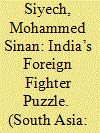

|
|
|
|
|
| Summary/Abstract |
Since its rise in 2014, Islamic State (IS) has attracted more than 30,000 volunteers to take part in the conflicts raging in Syria and Iraq. Despite a large presence of more than 160 million Muslims in India, not more than a hundred people have travelled abroad to join IS. This article attempts to explain the low participation of Indian Muslims in foreign conflicts. Drawing on existing literature and interviews with academics, government officials and members of the Muslim community across India, this article demonstrates that insurgency movements such as the Afghan Jihad in the 1980s, Indian government actions, and other factors such as logistical issues, family structure, ideological opposition and racism in IS ranks have collectively played a role in preventing Indians from taking part in the Syrian and Iraqi conflicts. This article is valuable given the low level of literature pertaining to Indian Muslims and their absence from the global jihadist community.
|
|
|
|
|
|
|
|
|
|
|
|
|
|
|
|
| 5 |
ID:
178162
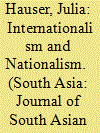

|
|
|
|
|
| Summary/Abstract |
Analysing Indian protagonists’ strategies at the 15th World Vegetarian Congress in India in 1957, this article argues that they brought together Hindu nationalism and internationalism. By constructing non-violence and vegetarianism as a national heritage, they characterised India as a moral superpower above the divisions of the Cold War and endowed it with a global civilising mission. On the other hand, they tried to win international support to influence the politics of the Indian government, opposing parts of the Five-Year Plans and Nehru’s politics of secularism. Moreover, by insisting on India as a vegetarian country, they erased Islam from Indian history.
|
|
|
|
|
|
|
|
|
|
|
|
|
|
|
|
| 6 |
ID:
178159
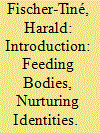

|
|
|
|
|
| Summary/Abstract |
This introductory essay provides an overview of the main subfields of research into the histories of foodstuffs, diet and nutrition in nineteenth- and twentieth-century South Asia, thus situating the contributions to this themed special section in wider historiographical debates and controversies. It argues that the bulk of existing research has focused either on the conflictual role of food and diet in the colonial encounter, or on the emergence of nutritional sciences in India (and in the countries providing food aid to India) during the post-colonial phase in response to the protracted recurrence of food scarcity in the subcontinent. It subsequently identifies a research lacuna by pointing to the conspicuous absence of historical studies on Dalits and food in spite of the topic’s obvious relevance for the creation and maintenance of social hierarchies. The article ends with short previews of the individual essays assembled in this collection.
|
|
|
|
|
|
|
|
|
|
|
|
|
|
|
|
| 7 |
ID:
178153
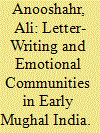

|
|
|
|
|
| Summary/Abstract |
This article investigates the letter-writing manual of the physician Muhammad Yusufi Haravi, composed in the 1530s at the court of the Mughal emperor, Humayun. It argues that by prescribing proper expressions of emotion based on one’s rank, the text reflects a combination of courtly desire and medical expertise which hoped to (but could not) transform the body politic (Mughal elite) into an emotional community. This was because the rapid establishment of Mughal rule in North India quickly scattered elite individuals far from their kinship groups, and the formation of a new social organisation, with the emperor at its apex, was a way to deal with the alienation that resulted from the breakup of kinship bonds.
|
|
|
|
|
|
|
|
|
|
|
|
|
|
|
|
| 8 |
ID:
178155
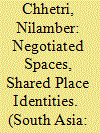

|
|
|
|
|
| Summary/Abstract |
Succeeding waves of mobilisation for the separate state of Gorkhaland has left an indelible imprint on the cultural, political and urban landscape of the Darjeeling Hills. Based on empirical research, this paper tries to explore the intricate relationship between ethnicity, place and politics of belonging in the Himalayan town of Kalimpong. It specifically tries to locate the interface between political events and the transformation of the urban landscape by taking into consideration the growth of roadside settlements. While noting the specific contours of these settlements, their culture and their liminal condition, the paper tries to address the issues pertaining to place-making and identity formation in the Himalayan region.
|
|
|
|
|
|
|
|
|
|
|
|
|
|
|
|
| 9 |
ID:
178157


|
|
|
|
|
| Summary/Abstract |
The radical Right in Europe and Islamist parties in Muslim countries have conventionally been portrayed as fundamentally different. The article uses material from Bangladesh to argue that the two share a wide set of characteristics and can be understood as fundamentally similar. Theoretically, we suggest a concept of the radical Right that encapsulates a set of deeper sentiments found to some extent in any culture or society. These deeper sentiments are normally obfuscated by attention-grabbing current events, but, isolated analytically, can be seen to give rise to parallel developments in different contexts. Our argument expands the theoretical value of the concept of the radical Right and helps understand recent political developments in Muslim-majority Bangladesh and, potentially, the wider authoritarian turn.
|
|
|
|
|
|
|
|
|
|
|
|
|
|
|
|
| 10 |
ID:
178156
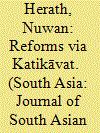

|
|
|
|
|
| Summary/Abstract |
The Theravadi Bhikku Kathikawath (Registration) Bill, presented to the parliament of Sri Lanka in January 2016, is a proposed framework for formulating codes of conduct for Buddhist monks. The bill marked an important moment in the politics of Buddhism, as it led to the emergence of competing views among lay and monastic groups over the question of who could introduce monastic reforms. The paper demonstrates that this effort at monastic reform encountered complexities when attempts were made to incorporate monastic jurisdiction into the state’s legal framework, which in turn led to the failure of the bill. Furthermore, monks from different monastic backgrounds called for deeper reforms of the religious environment itself and the monastic stratum that facilitated it.
|
|
|
|
|
|
|
|
|
|
|
|
|
|
|
|
| 11 |
ID:
178163
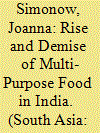

|
|
|
|
|
| Summary/Abstract |
This article traces the transnational history of Indian Multi-Purpose Food (Indian MPF, or simply MPF) to make two contributions to the historiography of development in post-War South Asia. Firstly, it illuminates the involvement of supporters of Indian nationalism in North America, who backed the use of food supplements in India, in the process of mobilising US resources to promote Indian national development in general, and family planning in particular. Secondly, the article sheds new light on the production of development knowledge on food and nutrition in early post-colonial India and the role that food science and technology assumed in national food planning in the first decades after Independence.
|
|
|
|
|
|
|
|
|
|
|
|
|
|
|
|
| 12 |
ID:
178154
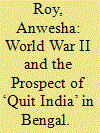

|
|
|
|
|
| Summary/Abstract |
This paper studies the years 1940–42 in Bengal with a view to analysing the social fuel that made the Quit India Movement possible in the province. War-time colonial policies created multiple disruptions and intrusions in the lives of the people of Bengal, building up anxieties and mass discontent. Coupled with widespread rumours, this profoundly reconfigured the image of the colonial state. This paper attempts to tap into the psyche of colonised minds in Bengal in the early stages of the war, which began to question British invincibility in the face of serious reverses in Southeast Asia. When a potent mix of mass discontentment and rumour was combined with ‘revolutionary’ political activism in the countryside, it acted as an explosive catalyst, animating the Quit India Movement.
|
|
|
|
|
|
|
|
|
|
|
|
|
|
|
|
|
|
|
|
|